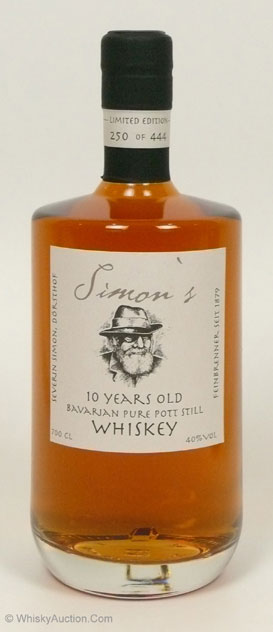 by
Fionnán
» Sun Nov 08, 2009 2:46 am
by
Fionnán
» Sun Nov 08, 2009 2:46 am
In addition, I agree that the push for a maintained standard
definition probably has to come from inside the industry itself.
Unless i'm mistaken, IDL have never really made an effort to get
a legal definition affixed to the phrase and, to be honest,
despite being its only current producers i feel that they tend
to seriously neglect it in favor of their mainstream blends. If
the Dingle group are as intent on producing PPS as they say they
are, than maybe the initiative will come from them, although the
last information i heard from them was in a prospectus
(discussed in the Dingle Distillery topic) that seemed to blur
the terminology line in the opposite direction.
As
for the national specifications, i'd be far more worried about a
legal name for the style itself than its origins. I'd fully
support legal restrictions on "Irish Pure Pot Still"
in the same way that there are restrictions on "Single Malt
Scotch" but i think the most pressing issue vis-a-vis the
term itself is to standardize its production implications rather
than its origins. (for example, Cooley's "Magiligans Pure
Pot Still" is a thoroughly Irish product but if someone in
a remote country distilled whiskey from a mixed mash of malted
and unmalted barley in a pot still, i'd consider the latter a
true PPS long before the former.) Curiously enough, I was
flipping through Charles MacLean's history on Scotch whisky the
other night and he mentioned that, aside from all the Scottish
stuff that was dubiously run through Irish customs houses and
then shipped out as Scotch, there were a few genuine expressions
of Pure Pot Still whiskey made in the lowlands by distillers
trying to meet the demand for the drink back in its 1860s
heyday. Specifically, Caledonian, which at the time was the
second largest column still grain distillery in Scotland,
installed two pot stills in 1867 specifically for the production
of PPS whiskey from a mixed malted and unmalted mash etc. Even
before that time, it seems to have been quite common in the
lowlands during the late 1700s to have used mixed mashes in
their stills. In "The Wealth of Nations" for example,
Scotland's own Adam Smith talks about the lowland industry by
remarking that "In what one called malt spirits, it [malt]
makes but a third part of the materials; the other two thirds
being raw barley or one third barley and one third wheat."
I remember hearing that the original Irish PPS whiskeys
sometimes used other grains than barley in the unmalted section
of the mash which seems rather similar to Smith's description.
Anyway, just an odd historical point that i found interesting

